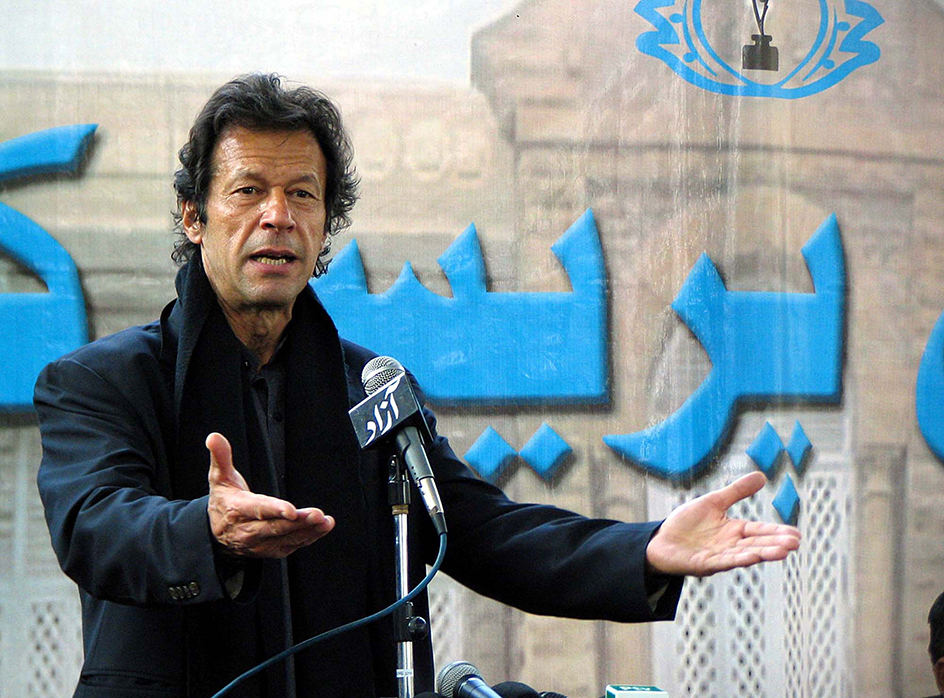Khan, Imran (1952-…), served as prime minister of Pakistan from 2018 to 2022. Khan entered politics and formed a new political party in the 1990’s. He served in the National Assembly from 2002 to 2007. Before entering politics, he had been a star cricket player from the early 1970’s to mid-1990’s.

Imran Ahmed Khan Niazi was born on Nov. 25, 1952, in Lahore, Pakistan. He began playing cricket for Pakistan in 1971. He played county cricket in England for Worcestershire from 1971 to 1976, for Oxford University from 1973 to 1975, and for Sussex from 1977 to 1988. He played in Australia for New South Wales in 1984 and 1985. Khan was a right-arm fast bowler and an attacking middle-order batsman. He captained the Pakistan cricket team in the years 1982-1983, 1985-1987, and 1988-1992. He led Pakistan to victory in the 1992 cricket World Cup. Khan retired as a player in 1992 but later served as a cricket commentator.
In 1996, Khan formed the Pakistan Tehrik-i-Insaaf (PTI, or Pakistan Movement for Justice), an opposition party calling for an end to government corruption. From 2002 to 2007, he served in the National Assembly representing Mianwali in the province of Punjab. In elections held in 2013, Khan’s party finished strong in some parts of Pakistan, but failed to win control of the national government, as Khan had hoped.
In July 2018, the PTI won the largest number of seats in the National Assembly. It formed a coalition with several other opposition parties and independent members, and Khan became prime minister in August. On becoming prime minister, Khan faced an economic crisis and high government debt. Beginning in early 2020, Pakistan also faced a public health crisis due to the global outbreak of COVID-19, as well as new economic stresses brought on by the pandemic.
In April 2022, Khan lost a no-confidence vote in the National Assembly and had to step down as prime minister. The Assembly elected Shehbaz Sharif, leader of the opposition party Pakistan Muslim League-Nawaz, as the new prime minister. In response, Khan organized cross-country protest marches and rallies and called for early parliamentary elections. In October, Pakistan’s election commission charged Khan with corruption for making false statements to the commission regarding his income in 2020 to 2021, suspended him from his seat in the National Assembly, and barred him from holding public office for five years. Khan claimed that the commission’s decisions were politically motivated.
In November 2022, a gunman shot at the vehicle in which Khan was standing during a rally. One person was killed and several others were wounded. Khan suffered wounds in both legs. In May 2023, Khan was arrested by Pakistan’s anticorruption agency. Protests by Khan’s supporters broke out across Pakistan in response.
In August 2023, Khan was convicted of corruption and sentenced to three years in prison. The sentence was suspended later that month, but Khan remained in prison on a charge of leaking (revealing) government secrets. On Jan. 30, 2024, Khan was convicted of leaking and was sentenced to 10 years in prison. The following day, he and his wife were convicted of graft, and each received a 14-year sentence, with Khan also being barred from holding public office for 10 years. On February 3, the couple were both convicted of breaking Islamic marriage law and sentenced to 7 years in prison. Khan was to serve his sentences concurrently (all at the same time).
